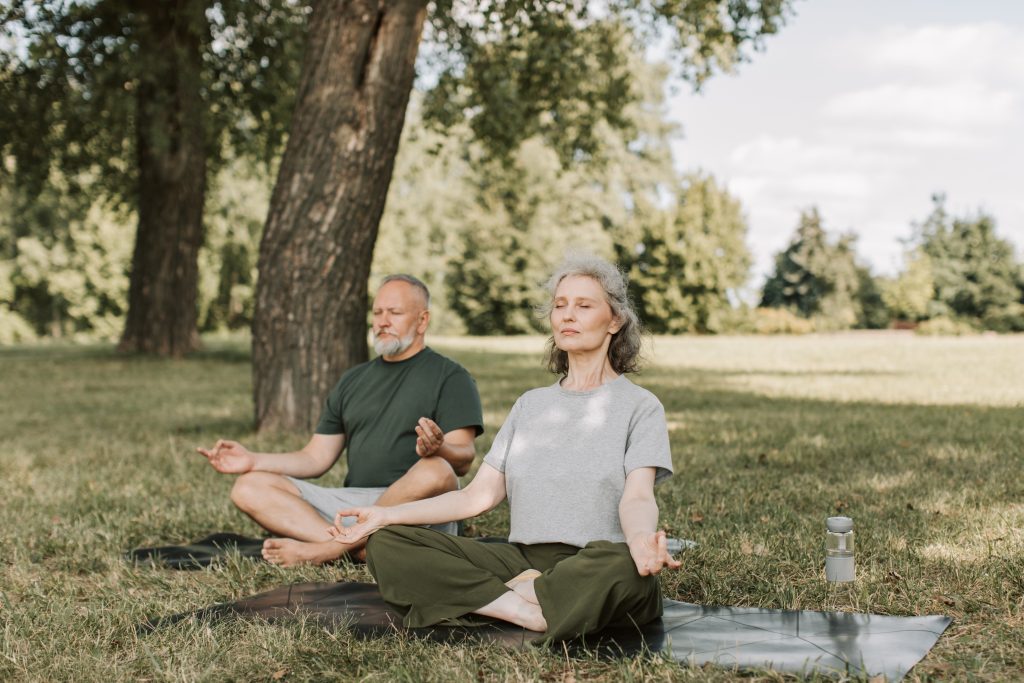Effective Exercises for Stress Relief at Home
Exercise and relaxation techniques are excellent ways to relieve some of the stress we all experience in daily life and to promote mental health. Once you learn how to reduce stress, you’ll start to feel better about your accomplishments and more comfortable saying “yes” to new things.
Explore these simple, useful stress relief techniques and start enjoying more peace in your life.
Noticing Stress and Where It Comes From
You hear about stress every day, whether it’s from your family, your coworkers, social media, or the news. But do you notice it in yourself?
Chances are, you’re dealing with your own stress on a daily basis, and even if you’re dedicated to a mindfulness routine every morning and a healthy work-life balance, stress levels still manage to rise or pop up in unexpected and inconvenient places.
Constant stress can have a negative impact on your overall health and well-being. A 2015 study in Psychosomatic Medicine identified chronic stress as a risk factor for cardiovascular disease.
Before you can start managing stress, it’s important to recognize the sources of it.
Identifying Common Causes of Stress
Finding out what’s causing your stress is key to overcoming it.
Some of the most common sources of stress include:
- Personal responsibilities
- Work and career tasks
- Relationships
- Finances
- Social anxiety
- Procrastination
Of course, there are many more potential causes of stress that are specific to people’s lifestyles and personal factors.
To start reducing stress and enhancing your mental health, spend some time taking stock. Think about your life, what you need to do on a daily basis, who’s depending on you, and how all of that contributes to the feelings of stress you experience.
Once you’ve thoroughly considered your feelings and identified some causes, it’s time to try the following ways to reduce stress and see what works best for you.
If you’re finding it difficult to manage situations without feeling overwhelmed and it’s affecting your stress levels, try some of the simpler stress relief and relaxation exercises below to help you think clearly and calmly.
How to Reduce Stress
From soothing relaxation exercises to mindfulness activities, these are some effective ways to lower stress.
Do Exercise and Physical Activity
Regular exercise is an extremely effective stress management practice that has numerous additional benefits for your body. And you don’t have to do intense HIIT workouts to gain the stress-relieving benefits of physical activity.
Low-impact aerobic exercises, such as walking, jogging, and even dynamic stretching promote blood flow and release endorphins—hormones that help relieve stress and the feeling of pain—according to Harvard Health Publishing.
You can also try yoga, tai chi, strength training, and other forms of exercise until you find the one that helps you forget about your stress and feel better about yourself.
Enjoy Massage Therapy
One of the best ways to achieve stress reduction is to relax, and one of the best ways to relax is to get a massage. Fortunately, you don’t have to go through the added stress of scheduling appointments and driving to clinics or spas to enjoy a soothing massage.
You can do a thoroughly relaxing massage at home with a handheld massager or a massage cushion. Handheld massagers are great for targeting specific areas where stress might be causing muscle tension and soreness.
Meanwhile, back massagers can work on the couch, in a chair, or in bed. You can use a large massage cushion to enjoy a full back, shoulder, and neck massage, or use a small portable cushion for quick massage sessions.
For added relaxation, choose a massage cushion with heating capabilities and let the hot kneading massage melt your stress away.
Practice Deep Breathing

Deep breathing is a practice many people neglect without even realizing it. When was the last time you focused on the rhythm of your breathing and let your lungs fill up completely?
Shallow breathing is common and quickly becomes habit, but deep, diaphragmatic breathing exercises can help you reduce your heart rate and relieve stress, according to a study in Neurological Sciences.
There are lots of useful deep breathing techniques you can try to lower stress, but some of the most popular include the following:
- Belly breathing
- Paced breathing
- 4-7-8 breathing
- Box breathing
Make Meditation and Mindfulness a Habit
While deep breathing exercise is itself a form of mindfulness, practicing more specific forms of meditation or mindfulness may be even more helpful for you as you learn to identify sources of stress and manage them better in the future.
Try using guided meditation apps and online videos as you learn how to quiet your mind and focus on the present moment. Then, you can try different mindfulness techniques, such as body scans to release tension in your muscles and walking meditation to clear your head while stretching your legs.
Color, Draw, and Journal
Putting pen to paper is another fun and freeing mindfulness activity that can help you reduce stress. Whether you’re scribbling doodles, free writing, listing tasks, and appointments, or coloring calming images, you can place yourself squarely in the present moment and leave stress for the future.
Using paper to plan and organize your life can also be more effective than tapping more and more notes and appointments into your phone, where they might disappear or become endlessly long lists of stress.
If you find that you like coloring as a way to reduce stress but carrying the physical materials isn’t convenient, try one of the many coloring apps available on smartphones and tablets.
Get Out in Nature
Nothing puts things in perspective quite like a walk in nature. But you don’t have to strap on the hiking boots to find stress relief. Even a simple walk around the block in the sunshine and breeze can invigorate your mood, inspire your thoughts, and calm your mind and body so you can better manage stress.
In a study in the International Journal of Environmental Research and Public Health, people who viewed natural scenes recovered from stress better than those who saw only human-built scenes. So get outside and let the fresh air help reduce your stress.
Dip Into a Foot Bath
Another excellent way to relax and relieve stress is to draw a soothing foot bath. The hot water in a foot bath is enough to help ease your stress and relieve sore feet on its own, but you can spruce up a foot bath for even deeper relaxation.
Try adding your favorite essential oils to the mix and enjoy the soothing fragrances for up to 30 minutes at a time or make an Epsom salt foot soak for a relaxing sensation.
For the ultimate foot bath, choose a foot bath that keeps the water warm and features massaging capabilities. Kneading massage nodes on the soft floor of the foot bath can help relieve tension in your feet and help promote the relaxation you need to reduce stress.
Eat Healthy and Reduce Caffeine
A healthy diet gives your body and brain the fuel they need to perform at their best, whether you’re in charge of running as the anchor in a sprint relay, managing an office, or juggling three kids with appointments and homework.
Be careful of overeating as a response to stress, as that can leave you feeling worse and lead to more issues in the long term.
Drinking too much caffeine to deal with stressful situations could lead to worse feelings of stress. If you’re already feeling tense, adding caffeine is a recipe for jitters and difficulty focusing.
Meanwhile, drinking alcohol to deal with stress will probably make it worse, not better, both in the short term and the long term. It’s best to prioritize a healthy diet and a good night’s sleep instead of trying to push through with caffeine or alcohol and late nights.
In addition, reducing or quitting nicotine and tobacco can help you manage stress. According to the Cleveland Clinic, these substances have the potential to increase stress, so using them could make the problem worse.
Use Aromatherapy
Aromatherapy is a simple way to make your environment more relaxing and conducive to stress relief. It’s easy to diffuse essential oils in your bedroom, your car, or wherever you need a little help keeping the stress out.
In a 2015 study in the International Journal of Nursing Practice, aromatherapy was extremely effective at reducing stress for 3–4 days at a time.
Using an essential oil diffuser can also be a great complement to other stress relief techniques on this list.
Essential oils
- Lavender essential oil (In the aforementioned study, lavender essential oil was the oil used.)
- Chamomile essential oil
- Orange essential oil
- Sandalwood essential oil
Spend Time With Friends and Hobbies

Enjoying time with family and friends is an easy way to forget about stress and feel the comfort of your favorite people’s company. Whether you’re playing games, traveling, or simply sitting and talking over a cup of coffee, catching up with the people you love is something you should make time for whenever possible.
Meanwhile, it’s important not to let the stress of work prevent you from enjoying the things you like to do, like hobbies and passion projects. If you find yourself neglecting “me time,” try scheduling time for your favorite activities so you can’t let other tasks push them to the side.
Reduce Stress to Work and Live Happier
You might think cramming to finally tackle that to-do list is what will eliminate stress, but the opposite may be a better approach.
Learning stress relief exercises at home can help you feel more relaxed and focused even with responsibilities all around you, leaving you with more energy and motivation to do what needs to be done without sacrificing all the activities you love.
Sources
- Associations of chronic stress burden, perceived stress, and traumatic stress with cardiovascular disease prevalence and risk factors in the HCHS/SOL Sociocultural Ancillary Study – PMC
- Endorphins: The brain’s natural pain reliever – Harvard Health
- Stress: Ways to Ease Stress
- The effects of aromatherapy in relieving symptoms related to job stress among nurses – PubMed
- Autonomic Nervous System Responses to Viewing Green and Built Settings: Differentiating Between Sympathetic and Parasympathetic Activity – PMC
- The role of deep breathing on stress – PubMed

